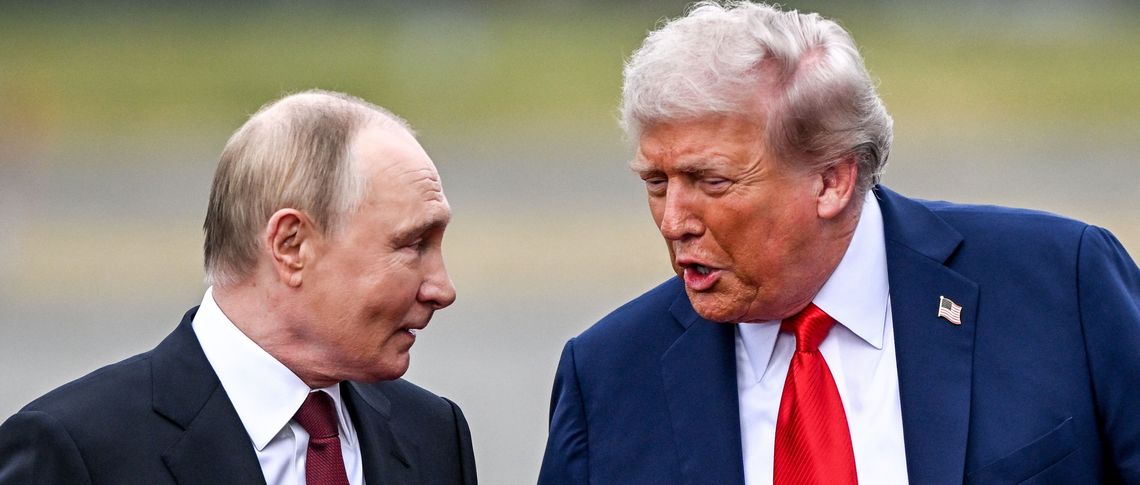After the Alaska summit and the European leaders’ visit to Washington, much of the debate has focused on territorial issues, security guarantees, and NATO membership. What, in your view, is the real driving force behind Putin’s invasion of Ukraine?
All of these factors matter, but they are not at the heart of the issue. Putin’s primary motivation is to destroy Ukraine’s democracy so it no longer serves as a model for the Russian people and an alternative to his stultifying autocracy. We need to understand that motive in order to grasp what it would take to prevent him from using any lull in the fighting to rebuild his forces, rearm and invade again. From Putin’s perspective, the war’s purpose is not fulfilled as long as Ukraine’s democracy is still functioning. Any meaningful resolution must therefore ensure that he cannot simply seize a new opportunity to crush Ukraine in the foreseeable future.
How does Ukraine’s democratic system pose a threat to Putin’s hold on power in Russia, given that Ukraine still struggles with corruption and press freedom rankings that hardly make it a flawless model of democracy?
Nobody would pretend that Ukraine is a flawless democracy, but it is a viable one. There are meaningful elections with real alternations of power — things you don’t have in Russia, but that many Russians desire. What makes Ukraine particularly influential is that, unlike an established democracy in Europe such as Germany, it is the second-largest post-Soviet state after Russia. It is Slavic, it is Orthodox — in many ways it looks like Russia, and therefore carries special weight with the Russian people. Many Russians are clearly unhappy with the autocratic turn their country has taken. Indeed, if Putin had not silenced dissent and surrounded himself with a sycophantic echo chamber, the Russian people would not now be suffering the consequences of his unilateral decision to invade Ukraine.
You argue that this war is fundamentally about democracy vs. autocracy. But couldn’t that be seen as a convenient Western narrative that downplays the complex ethnic, territorial and security factors often driving conflicts, including in Eastern Europe?
Putin clearly longs to resurrect the Soviet Union, which he has called the greatest catastrophe of the last century. But that is not a realistic option – especially since three former Soviet states, Lithuania, Latvia, and Estonia, are now NATO members. And none of the others want to return to Moscow’s control either.
Putin also speaks of the supposed threat from NATO expansion. Yet his invasion of Ukraine has done more to strengthen NATO than anything else: it brought in Sweden and Finland. And Finland, in particular, adds a serious military capacity to the alliance. He has also spurred a major, at least promised, increase in defence spending among NATO members. Most scenarios for a post-conflict Ukraine even envision European forces on the ground – the opposite of what Putin claims to want.
So, the idea that this war was an appropriate response to NATO expansion is simply not realistic. Ukraine’s membership in NATO was always a distant prospect, since Article 5 of the NATO treaty would effectively have required NATO countries to be at war with Russia today. That was never going to happen. I think this is a convenient rationalisation for an invasion that is actually motivated by other things.
Some in the West argue that ‘land swaps’ or territorial concessions could pave the way to peace. Why do you see such compromises as dangerous?
First of all, the language of ‘land swaps,’ which comes from Trump, trivialises the issue. It makes it sound like a real estate deal rather than a fight for Ukraine’s democracy. I personally would not insist that Ukraine retain sovereignty over every last bit of post-Soviet territory. But what Putin is now demanding is that Ukraine hand over large parts of Donetsk province that Russia doesn’t currently control – land that is home to hundreds of thousands of people.
This area is effectively Ukraine’s Maginot Line, where it has built very substantial defences. For Ukraine to give that up would open the door to what Putin really wants: a drive on Kyiv and a chance to destroy Ukraine’s democracy. It is a mistake to think of ‘land swaps’ as if this were just about territory. This land is in many ways even more important than the European peacekeepers being proposed to secure a post-ceasefire Ukraine.
You are a proponent of deploying European troops as peacekeepers. How realistic is that, given Russia’s deep hostility to Western involvement in its ‘backyard’ – and wouldn’t that risk a potentially catastrophic escalation?
At the moment, Russia insists on having a veto over any security guarantees, and of course it would reject what is currently on the table. But giving Moscow such a veto would essentially clear the way for a future reinvasion. That is not an option the West should accept, and it is certainly not one that Ukrainians will accept. Putin is not going to get everything he wants here.
This is part of his broader maximalist agenda. He feels he is making slow, incremental territorial gains in Ukraine. He seems indifferent to the massive loss of Russian lives his invasion is causing, willing to churn through Russian men for modest territorial advances. But there are limits. One is that he may eventually run out of Russians willing to throw themselves into the meat grinder, even with the ever-higher payments he offers their families.
Another limit could come if Trump moves beyond rhetoric and actually enforces his threats of ‘severe consequences’ should Putin refuse a ceasefire. That could mean new tariffs or other forms of pressure — the kind Trump has so far not been willing to apply. Such steps could increase the cost of Putin’s intransigence and make him more willing to contemplate the compromises needed for a lasting ceasefire.
Security guarantees are seen as crucial for Ukraine. What kind of guarantees would be both realistic and effective in deterring further Russian aggression?
We have to recognise that Ukraine feels burned by security guarantees in the past – most of all by the Budapest Memorandum. Back then, Ukraine gave up its nuclear weapons in exchange for promises from certain European nations, the United States, and Russia that its territorial integrity would be respected. That memorandum turned out to be worthless. So, Ukraine understandably wants something more reliable this time.
The most important element will be building up Ukraine’s own forces. They have the incentive to fight, and they have proven to be very effective. Putin’s demand that Ukraine be demilitarised is just another way of setting the stage for a later reinvasion.
Beyond that, it would be useful to have an international peacekeeping ‘tripwire’ in place to help deter further Russian aggression. In terms of realistic options, France and Britain are willing to put troops on the ground. I know Germany is considering it, and I hope it moves forward, because Germany would be a very significant part of such a force.
At the same time, all European troops understandably want a US backstop – not American boots on the ground, but US aerial and intelligence support to provide an additional deterrent against any future Russian attack.
You criticise that matters of war and peace hinge on Trump’s ‘fragile ego.’ But isn’t that ultimately a consequence of the current power balance and of Europe’s weakness?
It is appalling that issues of life and death, matters of democracy versus autocracy, depend so heavily on a fickle, self-centred American president. But unfortunately, that is the situation we face today.
You are right: this is in part a consequence of Europe’s military weakness. Europe has long underinvested in its own defence, relying instead on the United States to provide the overwhelming force within NATO. That worked for many previous American presidents, but it is no longer acceptable under Trump.
So, while Europe understandably has many other spending priorities, I see no alternative but to significantly increase military expenditures, given Trump’s unreliability. Until that happens – and it won’t be overnight – persuading Trump to provide some meaningful backstop for a European reassurance force in Ukraine is essential. And that, sadly, requires playing to Trump: stroking his fragile ego, building his self-esteem.
I am sure it is embarrassing for European leaders to have to go through these charades at the White House. But unfortunately, that is what needs to be done, given the enormous power of the US government and the relative military weakness of Europe.
Looking ahead, what concrete steps should Western governments take now to increase the costs of Putin’s continued war and strengthen Ukraine’s chances for survival?
For the European Union, the key will be making significant, long-term commitments to arm Ukraine at a substantial level. Another issue is the frozen Russian assets, much of which are held in European banks. While the revenue from those assets is now being used to fund Ukraine, the assets themselves have been deemed untouchable. That needs to be revisited, because they could become a major source of funding – both for sustaining Ukraine’s military and for rebuilding the parts of the country destroyed by Russian attacks.
Beyond that, it is crucial to enlist the considerable power of the US government. I would like to see European leaders, in a strategically savvy way, push Trump not just to mouth empty threats but to actually impose the severe consequences he has promised if Putin continues with his maximalist intransigence.
What about negotiations?
Of course, one wants a negotiated solution to the war. There is not going to be a decisive military victory on either side. Given the enormous loss of life and the tremendous costs, a negotiated outcome is obviously desirable.
I don’t think anyone rules out negotiating with Putin. But I would like to see Europeans more directly involved. They want that as well. At a minimum, these must be direct negotiations between Ukraine and Putin – they should not take place over Ukraine’s head.
I don’t see Europe being able to replace the United States in these talks, given Washington’s power. But I would certainly like to see Europe have a regular seat at the table.
This interview was conducted by Nikolaos Gavalakis.






